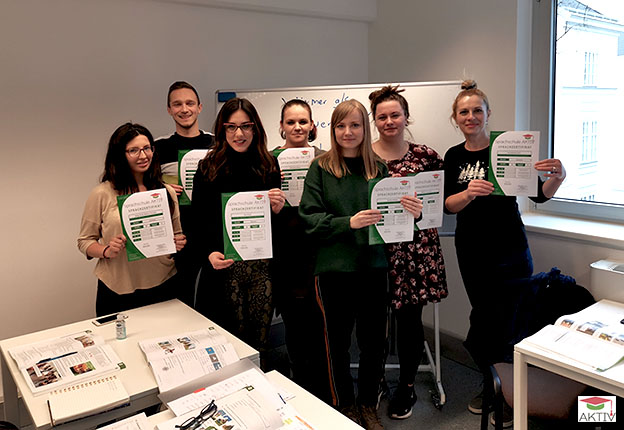The German Relative pronouns – learn German Grammar
If you want to learn German grammar, you have to learn the pronouns. Pronouns are little words that we use to avoid repeating a verb. You probably already know the pronouns for people: ich, du, er, sie, es, etc. But there is another special group of pronouns: relative pronouns. If you want to add additional information to a sentence, you can do that with a relative clause and a special pronoun. Relative clauses describe a noun more specifically and are always subordinate clauses i.e. the verb is at the end.
Each relative clause begins with a relative pronoun.
Das ist der Mann, der hier wohnt. – That is the man who lives here.
‚Der‘ is the relative pronoun. It looks like an article, but has a different function. It refers to the noun (the man) and describes it.
Formation of relative pronouns
In the nominative and accusative form, the relative pronoun’s form is the same as the form of the certain article.
Nominative: masculine der – feminine die – neutral das – plural die
Accusative: masculine den – feminine die – neutral das – plural die
There are special forms of the relative pronouns in the dative plural and genitive:
Dative: masculine dem – feminine der – neutral dem – plural denen
Genitive: masculine dessen – feminine deren – neutral dessen – plural deren
In order to form the correct relative pronoun, you need three pieces of information:
Quantity (is it singular or plural?), the gender (masculine, feminine or neutral?), and the case (nominative, accusative, dative, or genitive?)
Das ist der Mann. Der Mann wohnt in diesem Haus.
Der Mann in the first sentence is the reference to which we want to give the following information. It is singular (quantity), and masculine (gender). So we already have two pieces of information. For the third piece of information we need to look at the second sentence. Where here can we find the reference word?
Der Mann in the second sentence is the subject. And the subject is always nominative, so there we have our third piece of information – the case (nominative).
These three steps help us find the suitable relative pronoun
Our relative pronoun is: a) singular, b) masculine, c) nominative – der is the correct pronoun:
Das ist der Mann, der in diesem Haus wohnt.
Don’t forget: a relative clause is a subordinate clause where the verb is at the end!
Let’s look at another example: Das ist der Mann. Ich liebe ihn.
Let’s try is again with the three steps: a) singular (Mann), b) masculine (der Mann), c) accusative (Ihn) – den is the correct pronoun here.
Das ist der Mann, den ich liebe. – This is the man (who) I love.
And one final example:
Das sind meine Eltern. Ich helfe ihnen oft. – These are my parents. I help them a lot.
Let’s go through the three steps again: a) plural (Eltern), b) –, c) dative (ihnen) – so here denen is the correct pronoun.
Das sind meine Eltern, denen ich oft helfe.
Now we’re just missing the genitive which, as usual, is a bit unusual!
The genitive usually expresses something possessive. This is also the case with relative clauses.
Das ist der Mann. Sein Auto ist neu.
In order to get the correct pronoun, we need the three pieces of information again: a) singular (Mann), b) masculine (der Mann), c) genitive (sein = possessive article) – dessen is the correct pronoun here.
Das ist der Mann, dessen Auto neu ist.
Here is another example, but with a feminine reference word.
Das ist die Frau. Ihr Auto ist neu.
Once again, following our three steps: a) singular (Frau), b) feminine (die Frau), c) genitive (possessive article ‘ihr’). The correct pronoun is deren.
Das ist die Frau, deren Auto neu ist.
Small tip:
‚Sein‘ (masculine/neutral) is always tied to the relative pronoun ‚dessen‘.
‘Ihr’ (feminine/plural) is always tied to the relative pronoun ‘deren’.
Got it?
Practice The German Relative pronouns
Fill the gaps with the correct relative pronouns
- a) Kaufst du mit bitte dir Torte, _________ ich so gern mag?
- b) Oh, schau mal, da steht der Mann, ________ Sohn ein berühmter Sänger ist.
- c) Wo ist das Instrument, auf _________ ich das Weihnachtslied spielen wollte?
- d) Das Kind, ________ ich du gestern im Park gesehen habe, ist das Kind von meiner Nachbarin.
- e) Ich verstehe! Das ist die Tante aus Südamerika, ________ ihr geschrieben habt, er soll uns besuchen!

Answers: a) die; b) der; c) dem; d) das; e) der.
Would you like to improve your German grammar? Then visit on of our German courses!













